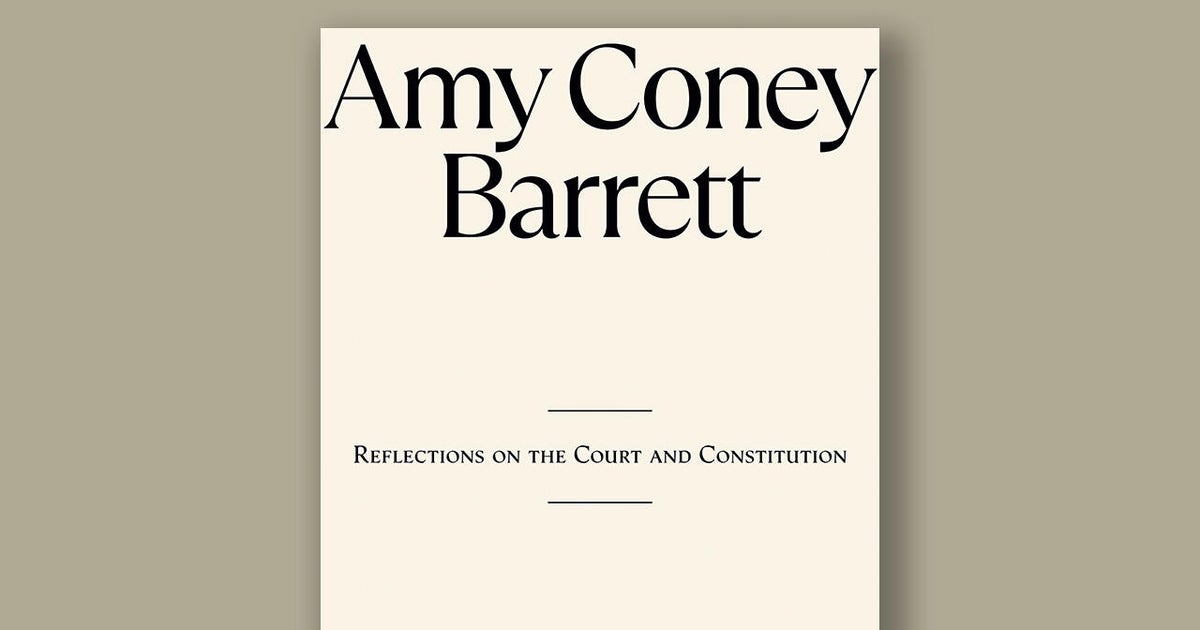
Sentinel
We may receive an affiliate commission from anything you buy from this article.
Notre Dame law professor Amy Coney Barrett was serving on the Seventh Circuit Court of Appeals in Indiana when she was nominated to the Supreme Court by President Trump in 2020. In her new memoir, “Listening to the Law: Reflections on the Court and Constitution” (to be published September 9 by Sentinel), Barrett writes of the decision she and her family made to “burn the boats” upon being asked to serve on the High Court.
Read an excerpt below, and don’t miss Norah O’Donnell’s interview with Justice Barrett on “CBS Sunday Morning” September 7!
“Listening to the Law” by Amy Coney Barrett
Prefer to listen? Audible has a 30-day free trial available right now.
I really loved my job on the Seventh Circuit and settled into the rhythm of hearing arguments and writing opinions. But after a few years, life took another turn: the White House counsel, who runs the judicial selection process for the president, invited me on behalf of President Trump to interview for a seat on the United States Supreme Court. Though I was deeply honored, I thought hard about whether to go forward. I knew that if I was chosen, both the confirmation process and the work of serving on the Court would require sacrifices, particularly from my family. Unlike my job on the Seventh Circuit, this one would require a move to Washington, D.C. We had a good life, wonderful friends, and close family in South Bend. We were attached to our old Prairie-style home, which was a short walk to campus for tailgates during football season—a fall family high- light. The move would mean changes for Jesse’s career and new schools for the children. We knew that public criticism was sure to come. And if I was nominated and confirmed, there would be a long-term loss of privacy for all of us. Public service was appealing, but the changes to our personal life were not.
In fact, I felt a pit in my stomach when I considered what might lie ahead. I had been considered for a seat on the Court two years earlier, when Justice Anthony Kennedy retired. Being a finalist had thrust me into the spotlight, which (to put it mildly) was not enjoyable. There had been an avalanche of news stories and social media posts—true and untrue, kind and cruel. It was difficult to have my life so publicly picked apart. There had also been a loss of physical privacy. Multiple camera crews parked outside our house and followed me by car when I pulled out of the driveway. I had one experience, funny only in retrospect, of realizing that I had been followed to church on a Sunday morning. I spent the whole Mass, not in prayer, but plotting an escape—a plan that culminated in my sneaking out a side door, scaling a fence in high heels, and—to the surprise of the associate pastor sitting on the rectory porch—dropping into the priests’ vegetable garden. (He was a happy co-conspirator; he took my keys and retrieved my car from the parking lot, allowing me to avoid the camera after all.) The scrutiny had affected my family too—given the number of strangers who had started walking past and driving by our house, Jesse and I were reluctant to let our kids play in the yard. It was not an experience I was eager to repeat.
Jesse and I had a very brief time to make one of the biggest decisions in our marriage. His position was full support on one condition: if we did it, we had to “burn the boats.” The phrase comes from a military strategy used by Alexander the Great, who, after landing on the shores of enemy territory, ordered his men to burn the ships they had come in. With the option of exit gone, there was no choice but to forge ahead, no matter the challenge. Likewise for us. There would be difficulties in store, some we could anticipate and others we couldn’t. Jesse wisely thought that it would be unsustainable to face the difficulties—whether in the confirmation process or beyond—if we gave ourselves the option to look back, wishing that we could unwind what we had done. There would be no second-guessing and no turning back to our comfortable life in South Bend.
So despite what might seem like a self-evident decision from the outside, saying yes to the interview, and then to the nomination, was not an easy call. I had just watched Brett Kavanaugh, whom I knew and respected, undergo a brutal confirmation process, and I was afraid of what I might face. I was reluctant to give up the good life we had for one that might prove to be less happy. Yet it seemed cowardly to bow out because we didn’t want to make the sacrifice. As I later told the Senate Judiciary Committee, I believe deeply in the rule of law and the Supreme Court’s role in preserving it; I also think that Americans of all backgrounds deserve an independent Supreme Court that interprets our Constitution and laws as they are written. It seemed strange to hold those views and be unwilling to serve, given that any nominee would face the same hardships. I accepted the interview and flew to Washington, D.C., to meet with President Trump. He announced my nomination on September 26, 2020, and the Senate confirmed me a month later. I have served as an associate justice since.
From “Listening to the Law: Reflections on the Court and Constitution” by Amy Coney Barrett, to be published on September 9, 2025 by Sentinel, an imprint of Penguin Publishing Group, a division of Penguin Random House, LLC. Copyright © 2025 by Amy Coney Barrett.
Get the book here:
“Listening to the Law” by Amy Coney Barrett
Buy locally from Bookshop.org
For more info:

